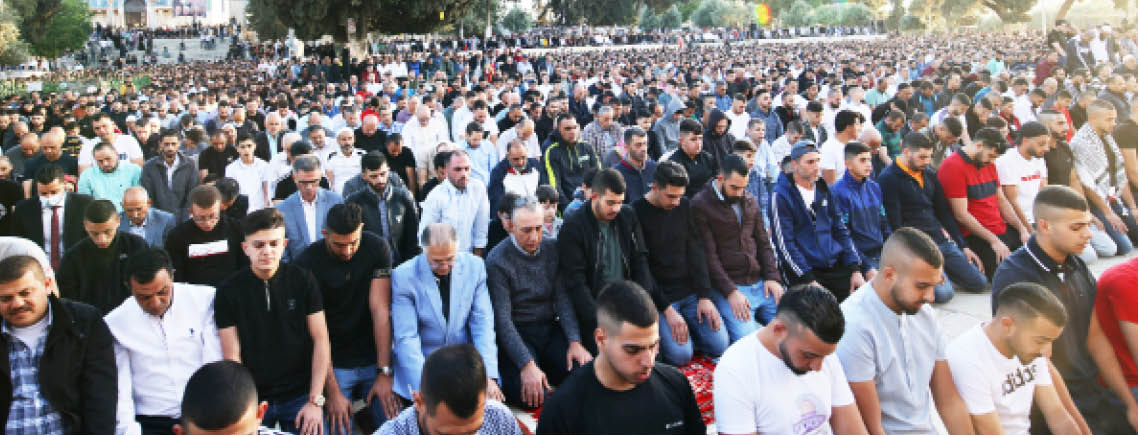Muslims mark Eid with masks and prayers amid COVID and conflict
Muslims around the world marked a sombre Eid al-Fitr on Thursday in the second celebration in the shadow of the coronavirus pandemic, and amid rising hostilities between Israel and Palestinians. The three-day festival, which marks the end of the holy fasting month of Ramadan, is traditionally celebrated with mosque prayers, family feasts and shopping for […]

Muslims perform the morning Eid al-Fitr prayer, marking the end of the holy fasting month of Ramadan, outside the Dome of the Rock mosque in the Al-Aqsa mosques compound in Jerusalem – Photo: AFP
Muslims around the world marked a sombre Eid al-Fitr on Thursday in the second celebration in the shadow of the coronavirus pandemic, and amid rising hostilities between Israel and Palestinians.
The three-day festival, which marks the end of the holy fasting month of Ramadan, is traditionally celebrated with mosque prayers, family feasts and shopping for new clothes, gifts and sweets.
- Nigerians decry nation’s woes as Buhari begs for understanding
‘$65 million fraud’: Buhari’s son-in-law declared wanted
Many COVID-hit countries, including India, Malaysia and Indonesia imposed restrictions, though the numbers of people out praying were higher than in 2020 when lockdowns all but cancelled events.
Meanwhile, in Turkey, Eid prayer was held at Istanbul’s iconic Hagia Sophia mosque on Thursday after an 87-year hiatus. Thousands of worshippers joined the prayer led by Ali Erbas, head of Turkey’s top religious body Diyanet.
Eid amid conflict
While the coronavirus pandemic forced curbs on Eid activities, for some the celebrations were halted by conflict. In the besieged Gaza Strip, the faithful prayed at mosques amid the rubble of collapsed buildings, as Israel’s air force continued to launch air strikes for a fourth day, targeting locations linked to the ruling group, Hamas.
“There is no Eid here,” journalist Sami Abu Salem reported from Gaza.
“Gaza is busy burying its dead people. There is grievance instead of happiness. The streets are empty … there are no social visits between people, relatives or neighbours,” Abu Salem said.
At least 86 people have been killed since Monday, including 17 children, according to Gaza health authorities, and more than 480 others wounded as heavy bombardment has rocked the densely populated coastal enclave and brought down entire tower blocks.
The escalation in violence came after weeks of tensions in occupied East Jerusalem over a scheduled court ruling on the forced expulsion of several Palestinian families from their homes in the Sheikh Jarrah neighbourhood. The court ruling has since been postponed. Frictions in the city were also heightened as Israeli security forces raided the Al-Aqsa Mosque compound for three straight days during the final week of Ramadan, with hundreds of Palestinians wounded.
In Jerusalem’s Old City on Thursday, some passers-by wore shirts decorated with Palestinian flags, others had painted them on their cheeks. Many were wearing the black-and-white chequered keffiyeh scarf which has become a symbol of the Palestinian cause. “We feel very sad for the Eid today, because of the situation and the violence,” Hiba told the news agency AFP.
“We can’t be happy when we see what is happening in Gaza and elsewhere.”
In Afghanistan, the Taliban declared a three-day ceasefire for Eid just days after a bombing that killed 80 people, most of them schoolgirls.
But the temporary ceasefire was short lived. At least 11 civilians were killed and 13 others were wounded in four separate bombings in Afghanistan on Thursday, just hours after it began.
In the Iraqi city of Mosul, which was badly damaged in the long war between Iraqi forces and the ISIS (ISIL) group that ended in 2017, worshippers gathered in the historic but largely ruined seventh century al-Masfi mosque.
Eid prayers were held there for the first time since parts of it were reduced to rubble. The prayers were instigated by a local group of volunteers to help amplify their calls for the Old City to be rebuilt.
“We are happy about Eid and other celebrations, but there is also heartbreak because of great destruction in Mosul until this day,” said Ayyub Dhanun, one of the volunteers.
